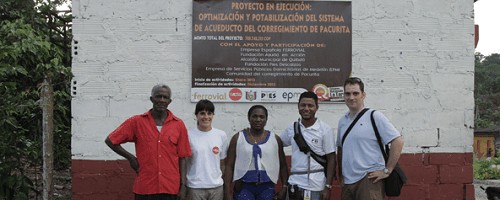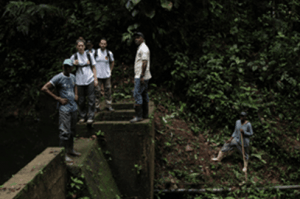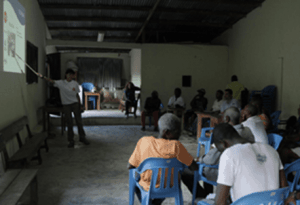
The four Ferrovial volunteers who went to Colombia to participate in the project being developed by the company to optimise and treat drinking water in the Pacurita district, in the Pacific region of the country, tell of their experience on the ground. Fernando, Lorena, Carlos and Ana worked on-site in the early stages of the engineering project, which will extend the supply of drinking water and the sewage network for local residents.
This engineering and cooperation project, chosen as part of Ferrovial’s Social Infrastructure programme and developed in cooperation with NGO Ayuda en Acción, will be executed in 12 months and will guarantee access to drinking water for around 1,300 people.
Fernando Arroyo Ortega
For the last seven years, Fernando has been in charge of operating Cespa‘s transfer plants in the Spanish province of Burgos. His expertise in the area of waste management enabled him to advise on waste processing and management in the weeks he spent in Colombia as a volunteer.
Why did you decide to join the Ferrovial volunteer program?
I’ve been working as a volunteer with a number of NGOs for many years, and I couldn’t pass up the opportunity to do so within my own company and in a country with which I am so familiar. Professionally, this experience enabled me to learn other work methods from Ferrovial professionals whom I might not have met otherwise; on a personal level, it enabled me to disconnect from my daily routine and build good friendships with colleagues from within the company.
What sort of reception did you get from the local staff and residents?
The local staff who worked with the people from Ferrovial gave us a superb welcome. The people from the NGO Ayuda en Acción and the Barefoot Foundation took very good care of us and worked hard to answer our questions and give us what we needed. The local government technical staff were very professional, participated actively in the project and responded constructively to the proposals made by the Ferrovial team. The local residents, particularly the project beneficiaries, welcomed the Ferrovial team with enthusiasm, expressing their hope that the project would come to a successful conclusion for all concerned.
Lorena Segura Villar
Lorena, who holds a degree in Civil Engineering, joined Ferrovial a year ago as a junior analyst at the Cities Division within Ferrovial Services. She contributed her expertise to the design and procurement work during her period with the team in Colombia.
You worked on-site on the project that Ferrovial is developing in Colombia to improve water systems. What did you do and what are your impressions?
There were four of us in the volunteer team. It was a multidisciplinary team with the skills to provide technical support for the project. From the outset, we distributed functions and split into two teams: one to review the design and handle the procurement process, and the other to structure training session for local residents and local government in order to ensure that the water purification plant was properly operated and maintained, as well as ensuring proper waste management. The area of Colombia where the project is located has very abrupt terrain, which posed major challenges for the construction work. Seeing the motivation and enthusiasm on the part of the project’s beneficiaries was an additional stimulus to our work as volunteers.
What was most memorable about your stay there?
What most surprised me was how people live their lives in the area. People didn’t appear to let future considerations shape their current attitudes. This was clear in how they managed water, for example. Chocó, the area of Colombia where the project is located, is one of the rainiest regions on the planet; as a result, locals are not aware about water needs and use triple the world per capita average. So, considering that local conditions are not conducive to water saving, I was amazed to see that local leaders were strongly convinced of the need to change local people’s attitudes.
Carlos Cordon Ureña
Carlos is currently a manager of Operation, Maintenance and Projects at Cadagua. With over 10 years’ experience at Ferrovial in project development, execution and management, Carlos was in charge of reviewing and enhancing the design of the project and providing support for the procurement phase.
Could you describe briefly what a day was like there?
We would get up very early, since it dawns very early there and it was also a good time for handling work-related tasks in Spain. Then, the whole Ferrovial team would have breakfast together, while also sharing out the work and scheduling visits, workshops and meetings. After that, time just flew by because we had so much to do, not to mention handling emerging issues. In the evening and at dinner, we would relax and explore the area. We went to bed early since the days were very intense and tiring.
What did you gain from this experience, on a professional and personal level?
From a professional standpoint, I gained insights into how work is done in another country and developed relationships with professionals in my own field. On a personal level, I am very satisfied that I was able to make a small contribution to helping people who need it.
Ana Corral Sanz
Ana, who joined Cadagua in 2004, is part of the Operation & Maintenance department in the Catalonia/Balearic Islands region. With a background as a lab analyst at the DAMM brewery industrial wastewater treatment plant and manager of the municipal water treatment plant in Formentera, Ana currently manages the industrial wastewater treatment plant at Coca-Cola bottler Cobega. Her contribution to the project involved reviewing the design and sampling and checking water quality, as well as providing training on water treatment and management.
Was it a challenge to work under conditions that were totally different from those that you are accustomed to in Spain?
It certainly was, because in Spain you have the technology, the infrastructure, and the resources, whereas in Colombia they know the technology but it cannot be applied in most cases due to limitations in terms of infrastructure and resources. This experience taught me humility on both a professional and a personal level; I mean, the greatest merit lies not with the person who knows the most but with the one who can best adapt to the circumstances.
Do you have any memories that you would like to share?
My best memory of Colombia was when we provided training to the local population in Pacurita and were able to chat with them afterwards. I realized that those people were very enthusiastic about making improvements; though not highly educated, they used common sense and were seeking solutions to their problems. We were there just to show them how to implement their project, obtain drinking water and manage the waste.







There are no comments yet